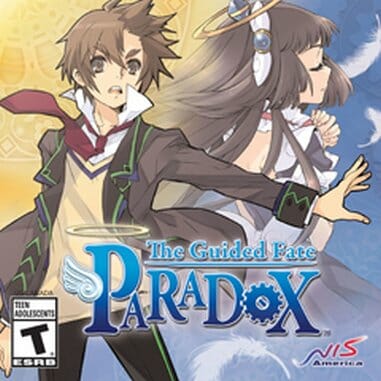The Guided Fate Paradox

Right before the tutorial begins, The Guided Fate Paradox asks: “Have you had any experience being God before?” (translation: skip the tutorial)
Your choices are:
> O-of course not!
> I’ve got a black belt in God-kwan-do
The premise of The Guided Fate Paradox is that a Japanese high school student wins the lottery. His prize is to become God. This is never not funny. Regular exchanges in this game: “Sup’? I’m God.” “Will I ever see you again?” “Probably not. I’m God.” This lightens the often obscure, usually amusing, frequently awkward, jarringly serious, and very, very anime story of The Guided Fate Paradox.
As expected from the makers of Disgaea, the story is wacky and strange, yet it still asks to be taken seriously at times. There is absolutely no chance of that happening. Here I am, rolling my eyes, saying “oh gosh this is so silly and hahaha did that seriously just happen” because every main character is an angel wearing a french maid or butler costume. They all have ridiculous, exaggerated personality types like “over-sexualized nurse,” “uptight pretty boy,” and “Vampire the Masquerade LARP.”
But after about ten hours of these idiot goofballs, I realize: “help, I actually am starting to care a huge, embarrassing amount for them and their incomprehensible melodrama!” Nippon Ichi’s formula for success has been to not take itself seriously except when it suddenly does. Even though this technique is as awkward in The Guided Fate Paradox as it ever has been, it turns out to work on me really well! I feel like I should be kind of not so forthcoming about that. Whoops.
The plot is great, because it doesn’t make any sense at all, and nobody in the story cares. Here is one weird tip for game designers who do not like terrible stories: if you don’t take yourselves too seriously, you don’t have to waste your time explaining all of the videogame junk that is in your game because it is a videogame.
Here is the story of GFP: a pathologically generic high school boy is selected via lottery by a group of very cute and fairly sketchy angels to become God, which he does by using a machine called the Fate Revolution Circuit, which grants the wish of creatures (humans/mermaids/zombies/fictional characters) that have prayed to God by creating a copy of the wisher’s world that they can use to subtly influence the original world by killing monsters in randomly generated dungeons. Wow, right? But the game just goes on without caring.
Each dungeon revolves around one of these wishes, and the wishes are usually amusing but a bit cut-scene heavy—there’s one between each floor of the dungeon and, as this game is a roguelike, each floor takes barely as long to complete as the cut-scenes. At ten floors per dungeon, this is exactly five more cut-scenes than are needed to tell the story. The wish stories start getting repetitive very fast, even when they have interesting premises like “self aware Cinderella makes feminist reading of her own narrative” or “cowardly zombie wants to stop being bullied so he can eat human flesh” or “heartbroken mermaid wants to literally kill all men.” All these wishes are great, but they all get granted in a status quo-affirming way, which was quite a letdown.
The script is also fairly awkward, with a lot of word choices and grammatical phrasing that is technically correct but awkward to English ears—the result of literally translated Japanese that hasn’t been cleaned up. NIS America’s localization is peppered with relevant and amusing jokes (and thankfully it keeps tired memes to a minimum), though it still feels clunky at times compared to other localizers.
Okay, and this is also a video game. Because killing monsters in randomly generated dungeons helps to grant the wishes of mortal beings for Basically No Reason, The Guided Fate Paradox is a roguelike, though it is very different from the last few roguelikes I have reviewed here at Paste. There are a couple of reasons for that. One is that Japanese roguelikes have followed a very different evolutionary path than the contemporary western resurgence. Both are influenced by the almost-as-old-as-the-desktop-computer Rogue, but Japan was introduced to the genre mostly through the Super Nintendo game Mysterious Dungeon. The Guided Fate Paradox retains a lot of that game’s features, like banking items and money, and a town that persistently upgrades as you progress.

